New towns of Singapore
The new town planning concept was introduced into Singapore with the building of the first New Town, Queenstown, from July 1952 to 1973 by the country's public housing authority, the Housing and Development Board. Today, the vast majority of the approximately 11,000 public housing buildings are organised into 22 new towns across the country.
Each new town is designed to be completely self-sustainable. Helmed by a hierarchy of commercial developments, ranging from a town centre to precinct-level outlets, there is no need to venture out of town to meet the most common needs of residences. Employment can be found in industrial estates located within several towns. Educational, health care, and recreational needs are also taken care of with the provision of schools, hospitals, parks, sports complexes, and so on.
Singapore's expertise in successful new town design was internationally recognised when the Building and Social Housing Foundation (BSHF) of the United Nations awarded the World Habitat Award to Tampines New Town, which was selected as a representative of Singapore's new towns, on 5 October 1992.[1]
New Towns
| Name (English/Malay) | Tamil | Chinese | Hanyu Pinyin | Area (Total) |
Area (Residential) |
Residential units | Residential units (Projected) |
Population | Image | Remarks |
|---|---|---|---|---|---|---|---|---|---|---|
| Ang Mo Kio | ஆங் மோ கியோ | 宏茂桥 | hóngmàoqiáo | 638 | 283 | 48,068 | 58,000 | 151,700 | ||
| Bedok | பிடோ | 勿洛 | wùluò | 937 | 408 | 59,201 | 74,000 | 201,300 | ||
| Bishan | பீஷான் | 碧山 | bìshān | 690 | 172 | 19,367 | 32,000 | 67,400 | ||
| Bukit Batok | புக்கிட் பாத்தோக் | 武吉巴督 | wǔjíbādū | 785 | 291 | 31,731 | 47,000 | 112,100 | ||
| Bukit Merah | புக்கிட் மேரா | 红山 | hóngshān | 858 | 312 | 50,247 | 68,000 | 147,000 | ||
| Bukit Panjang | புக்கிட் பாஞ்சாங் | 武吉班让 | wǔjíbānràng | 489 | 228 | 29,498 | 43,000 | 113,000 | 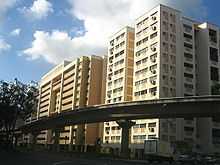 |
|
| Choa Chu Kang | சுவா சூ காங் | 蔡厝港 | càicuògǎng | 583 | 307 | 39,511 | 62,000 | 155,800 | ||
| Clementi | கிளிமெண்டி | 金文泰 | jīnwéntài | 408 | 198 | 23,871 | 35,000 | 74,500 | ||
| Geylang | கேலாங் | 芽笼 | yálóng | 678 | 214 | 30,510 | 49,000 | 96,900 | ||
| Hougang | ஹவ்காங் | 后港 | hòugǎng | 1,276 | 354 | 47,819 | 68,000 | 173,500 | 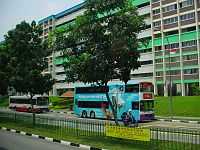 |
Largest new town in terms of total land area. |
| Jurong East | ஜூரோங் | 裕廊东 | yùlángdōng | 384 | 165 | 22,299 | 29,000 | 81,000 | ||
| Jurong West | ஜூரோங் | 裕廊西 | yùlángxī | 987 | 480 | 68,760 | 92,000 | 251,200 | 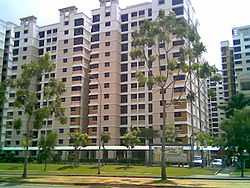 |
Largest new town in terms of existing residential units. |
| Kallang/Whampoa | காலாங் | 加冷/黄浦 | jiālĕng/huángpǔ | 799 | 200 | 34,288 | 54,000 | 104,900 | ||
| Pasir Ris | பாசிர் ரிஸ் | 巴西立 | bāxīlì | 601 | 318 | 27,514 | 44,000 | 109,700 |  |
|
| Punggol | – | 榜鵝 | bǎng'é | 957 | 422 | 30,877 | 96,000 | 92,500 | ||
| Queenstown | குவீன்ஸ்டவுன் | 女皇镇 | nǚhuángzhèn | 687 | 210 | 29,812 | 60,000 | 85,000 | First new town in Singapore. | |
| Sembawang | – | 三巴旺 | sānbāwàng | 708 | 317 | 18,421 | 60,000 | 67,400 | 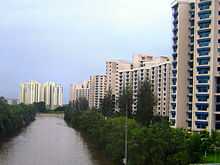 |
|
| Sengkang | செங்காங | 盛港 | shènggǎng | 1,055 | 397 | 43,848 | 90,000 | 156,200 | ||
| Serangoon | சிராங்கூன் | 实龙岗 | shílónggāng | 737 | 156 | 21,292 | 29,000 | 75,800 | 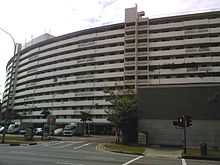 |
|
| Tampines | தெம்பினிஸ் | 淡滨尼 | dànbīnní | 1,200 | 500 | 62,369 | 83,000 | 235,800 | Largest new town in terms of population | |
| Toa Payoh | தோ பயோ | 大巴窑 | dàbāyáo | 463 | 210 | 35,418 | 48,000 | 105,400 | Second new town in Singapore. | |
| Woodlands | ஜூரோங் | 兀兰 | wùlán | 1,198 | 525 | 58,525 | 88,000 | 229,500 |  |
|
| Yishun | – | 义顺 | yìshùn | 810 | 439 | 46,965 | 84,000 | 173,300 | ||
| Other Estates (Bukit Timah, Central Area, Marine Parade) | 126 | 22,898 | 25,000 | 66,500 | ||||||
| Total | 890,212 | 1,418,000 | 3,094,100 | |||||||
See also
- Public housing in Singapore
- Public housing precincts in Singapore
- Housing and Development Board
- Cash-Over-Valuation
- Executive Condominium
- Housing and Urban Development Company (HUDC) Flats
- New towns of Hong Kong
References
- ↑ Building Social Housing Foundation, Tampines Town, accessed 19 Mar 2007.
| ||||||||||||||||||||
